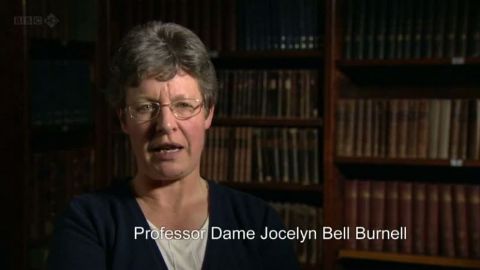Beautiful Minds • 2010 - 2012 • 6 episodes • 5h:50m
Series in which three of Britain's most influential and respected scientists explain how their unique scientific perspectives have redefined how we think about the world around us.
Professor Dame Jocelyn Bell Burnell describes how she discovered pulsars, the by-products of supernova explosions which make life in the universe possible. She describes the moments of despair and jubilation as the discovery unfolded and her excitement as pulsars took the scientific world by storm. Reflecting on the nature of scientific discovery, she talks about the connections between religion and science and how she sees science as a search for understanding rather than as a quest for truth.
S1E1 • 2010 • Physics
In a series about scientists with brilliant minds, James Lovelock explains how his maverick way of thinking led him not only to technical breakthroughs in atmospheric detection systems on Earth and Mars, but also to Gaia - a new way of thinking about the Earth as a holistic, self-regulating system. He tells of his struggle against the scientific consensus of the day, the ridicule of his peers and his belief that the mainstream scientific establishment stifles intellectual creativity.
S1E2 • 2010 • People
Sir Tim Hunt, awarded the Nobel Prize for his discovery of the mechanism of how cells divide, recalls moments in his life that provided inspiration for his career as a scientist, from his father's intent scholarship which shaped his early methods to his mother's battle with cancer and the influence of this on his position at Cancer Research UK. Hunt recounts the events that informed his discovery and reveals his own opinions on the thought processes, both logical and emotional, that led to it.
S1E3 • 2010 • People
Jenny Clack recounts how she overcame setbacks before she found and described a fossil which offered new evidence of how fish made the transition onto land. For paleontologist Professor Jenny Clack, who solved one of the greatest mysteries in the history of life on Earth, success was far from inevitable. A chance discovery in 1986 in the earth sciences department of Cambridge University, of long-forgotten fossils collected from the Devonian rocks of East Greenland in 1970, was to shape the rest of her career. She recounts how she had to overcome a series of setbacks before she found and described the fossil Acanthostega, a 365 million-year-old creature that offered dramatic new evidence of how fish made the transition onto land. She authored or co-authored more than 120 research papers as well as numerous popular articles and book reviews. A measure of the significance of her work is that 15 of her research papers were published in the journal Nature. Her one book, "Gaining Ground, The Origin and Evolution of Tetrapods" (2002), summarises the results of research on early tetrapods over the previous 25 years.
S2E1 • 2012 • People
Professor Andre Geim is a condensed matter physicist at the University of Manchester. His life's work has been to gain a better understanding of the materials that make up the world around us. While just one subject can be a scientist's life's work, Andre has made switching fields a feature of his career. But while straying from the conventional path can be risky for a scientist, Andre has repeatedly turned it to his advantage. His "let's try it and see" approach means he's the only individual winner of the both the Nobel and the more light hearted Ig Nobel Prizes. He won the Nobel Prize for Physics in 2010 for uncovering the extraordinary properties of a material called graphene, but Geim can also lay claim to seeding two other new areas of physics research--levitation and gecko tape.
S2E2 • 2012 • People
Dawkins discusses his book, the Selfish Gene, which divided the scientific community and made him the most influential evolutionary biologist of his time. Professor Richard Dawkins is one of the most well-known and controversial scientists in Britain. A passionate atheist he believes science rather than religion offers us the best way to appreciate the wonders of the Universe we live in. In the last 10 years he has become notorious for his outspoken views on religion, but at the heart of his success is his explosive first book -- The Selfish Gene -- which put forward a radical rewriting of evolutionary theory and divided the scientific community. Much of the controversy comes from its provocative title.
S2E3 • 2012 • People





